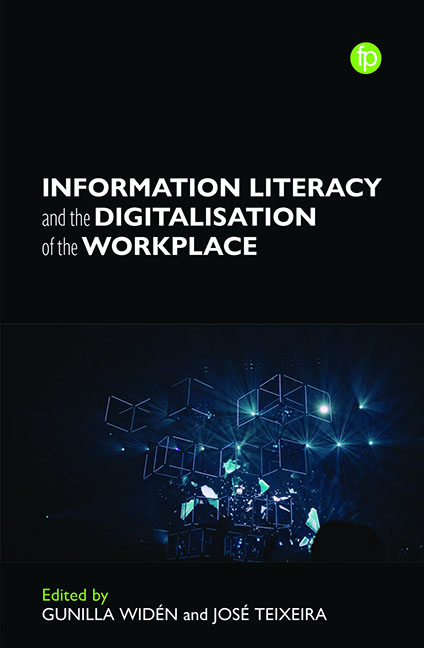Book contents
- Frontmatter
- Contents
- Figures and Tables
- Contributors
- Introduction: Advancing Theory on Workplace Information Literacy
- 1 Literature Review: In Search of the Many Meanings of Information Literacy
- 2 Digital Literacy in a Post-Digital Era: Rethinking ‘Literacy’ as Sociomaterial Practice
- 3 Methodological Choices of Information Literacy in the Workplace: Qualitative, Quantitative or Mixed-Methods?
- 4 Investigating Information Seeking and Information Sharing Using Digital Trace Data
- 5 Making Do With Limited Transparency of Sensitive Information in Secretive Organisations: Collective Information Literacy Through Hinting
- 6 Information Literacy Competencies for Career Transitions in the Digital Age
- 7 The Importance of Information Literacy for Work Satisfaction in a World-Wide-Workplace Context
- 8 Entrepreneurs’ Digital Information Sources Selection: A Perspective on the Impact of Information Literacy and Generational Differences
- 9 Conclusion: Workplace Information Literacy as the Literacy of the Digital Workplace
- Index
5 - Making Do With Limited Transparency of Sensitive Information in Secretive Organisations: Collective Information Literacy Through Hinting
Published online by Cambridge University Press: 17 December 2023
- Frontmatter
- Contents
- Figures and Tables
- Contributors
- Introduction: Advancing Theory on Workplace Information Literacy
- 1 Literature Review: In Search of the Many Meanings of Information Literacy
- 2 Digital Literacy in a Post-Digital Era: Rethinking ‘Literacy’ as Sociomaterial Practice
- 3 Methodological Choices of Information Literacy in the Workplace: Qualitative, Quantitative or Mixed-Methods?
- 4 Investigating Information Seeking and Information Sharing Using Digital Trace Data
- 5 Making Do With Limited Transparency of Sensitive Information in Secretive Organisations: Collective Information Literacy Through Hinting
- 6 Information Literacy Competencies for Career Transitions in the Digital Age
- 7 The Importance of Information Literacy for Work Satisfaction in a World-Wide-Workplace Context
- 8 Entrepreneurs’ Digital Information Sources Selection: A Perspective on the Impact of Information Literacy and Generational Differences
- 9 Conclusion: Workplace Information Literacy as the Literacy of the Digital Workplace
- Index
Summary
Introduction
A key feature of digitalisation is making information available through digital technologies (McAfee and Brynjolfsson, 2014). Through the exponential increase in the capacity of digital infrastructures, a fact of contemporary digitalisation is the increased amount of digital information available and the new platforms available to work together digitally (Yoo et al., 2012). With these aspects comes the increased challenge of understanding, using and managing information – the challenge of information literacy (Bawden, 2001).
The concept of information literacy entails all sorts of skills and abilities related to the managing of information, such as identifying, accessing or constructing it; evaluating and managing it; and analysing and synthesising it (Martin and Grudziecki, 2006). These skills and abilities have been argued to be collectively anchored (Martin and Steinkuehler, 2010) and are fundamental for modern workplaces (Ahmad, Widén and Isto, 2020), more so due to digitalisation. Indeed, organisations today critically depend on their ability to use and manage information in an era of information overload.
However, not all organisations are necessarily overwhelmed with inform - ation. Some information may, for example, deliberately be kept amongst those at the executive level of the organisation or within specific groups or departments through deliberate information management processes (Whyte and Levitt, 2010). Often, organisations also work hard on managing which information is made available to people outside of the organisation (Costas and Grey, 2014). In some organisations, this deliberate limiting of information is a way to prevent third parties accessing critical information, since information that falls ‘into the wrong hands’ may disrupt organisational activities in different ways (Cram, Proudfoot and D’Arcy, 2017). In these situations, information is considered ‘sensitive’. Studies of sensitive information have in the past engaged with the problems of how sensitive information is still drawn upon, despite being subjected to a sharing-protecting tension, particularly in contexts of inter-organisational co-operation where distrust and disparate motives reign among involved parties (Bouty, 2000; Das and Teng, 2000; Jarvenpaa and Majchrzak, 2008). These studies indicate the need to not only use and manage information, but also point to the importance of organisational members ‘sensing’ how to navigate information without risking detrimental ‘oversharing’ across organisational boundaries (Jarvenpaa and Majchrzak, 2016).
- Type
- Chapter
- Information
- Publisher: FacetPrint publication year: 2023



